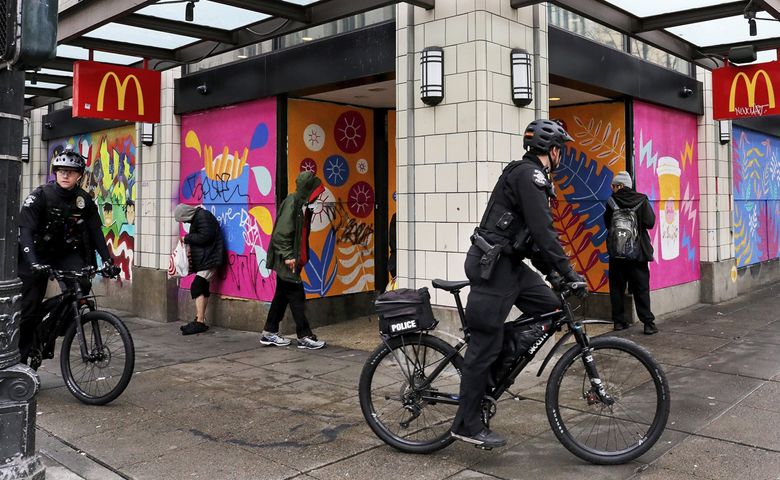Recently, local officials have launched a slew of crime-fighting efforts that brought desperately-needed relief to some beleaguered spots around town, including Little Saigon and Third and Pine downtown.
The roster of agencies involved has been wide-ranging, from the city on up to the feds. And the new campaigns have come with branding such as “Operation New Day” — suggesting that this time really is going to be different in Seattle.
Hopefully so. I’m of the view that breaking up concentrated criminal activity that has settled onto a neighborhood is a welcome step even if it doesn’t solve long-term problems.
That said, a review of the arrests and, more importantly, the judicial decisions made to date suggests we may already be tilting back more toward “Operation Same Old Revolving Door.”
Of 16 people arrested for suspected felonies in Little Saigon as part of Operation New Day, it turns out only two stayed in King County Jail for more than a day or two. Three are now in federal detention, which I’ll get to in a minute. But most were either released immediately by judges or asked to post very low bail, which they did.
This includes some offenders who are right in the intersection of Seattle’s two street plagues — synthetic drugs and guns.
The fourth armed defendant, Cuong Cao, was, as of Friday, still loose, described now by a federal justice spokesperson as a “fugitive.” There’s no reason for him to be a fugitive though because he was arrested at 12th and Jackson last month after police say they watched him selling fentanyl pills on the sidewalk and then crouching over a woman who was overdosing.
When Cao was booked, he was carrying heroin, meth, and 88 “blues” — street slang for fentanyl pills — along with $800 in cash and a Canik 9-mm pistol. He’s got a slew of felony convictions for burglary, car theft, and drug dealing, and he’s had 39 arrest warrants going back 20 years because of a propensity to not show up in court.
Yet he was out of jail 45 hours later on just $2,500 bail, down from the $75,000 requested by prosecutors.
Police say another of the four, Joseph Johnson, was selling fentanyl at 12th and Jackson while carrying a loaded 9-mm pistol. Past convictions don’t allow him to carry a gun, and he also had 17 arrest warrants. He was released anyway.
His story has turned into a sort of a revolving door case study because Johnson was then rearrested a few weeks later down at Seattle’s other big hot spot, Third and Pine.
The good news is, that’s one ghost gun, finally, off the street.
The bad news is: Why are these armed suspects, some with a history of violence, passing through the local court system like water through a sieve?
I’m with the public defender types that it does little good to punish drug users. They should be held accountable for petty crimes like shoplifting. That accountability, though, should be delivered with a heavy dose of help.
But if you’re toting around illegal guns along with satchels of drugs and cash, and have a record of violence? That’s not the same thing.
Yet the revolving door there seems to be spinning as rapidly as ever.
A press statement talked about all the recent arrestees who “were released by judges … over the objection of the King County Prosecuting Attorney’s Office, including one suspected drug dealer with a loaded 9mm handgun.”
Leesa Manion, chief of staff of the prosecutor’s office, put it like this: “Our deputies proceeded to court every day and urged the court to ensure that these individuals were held, making the argument that immediate release would send the wrong message.”
Now Seattle and King County have debuted what they’re calling the “High Utilizers Initiative” — Seattle-speak for people who get arrested over and over. The goal is to break the cycle for 118 prolific offenders, who have collectively committed 2,400 offenses, by using more aggressive prosecution along with social services.
It sounds fine but it follows similar efforts in the past: the “Familiar Faces Initiative,” the “High Impact Priority Repeat Offenders Program,” the “High Barrier Individuals Working Group.”
It also may prove meaningless if the rest of the legal system, including the judiciary, isn’t on the same page.
Ryan Palmer was picked up at 12th and Jackson offering to sell “crack, hard and blues,” according to police. In court, prosecutors said Palmer has been charged in Seattle more than two dozen times just since 2016, including six times for assault and for “unlawful use of a weapon to intimidate.” He’s had eight warrants for not showing up, including two that are active today, and has been in and out of diversion programs, all to no avail.
He was released anyway.
Our city is in a great debate on what to do about street crime — whether to go hard, soft, or somewhere in between. What we have at the moment is a portrait of a system that can’t make up its mind.
Source: seattletimes.com

